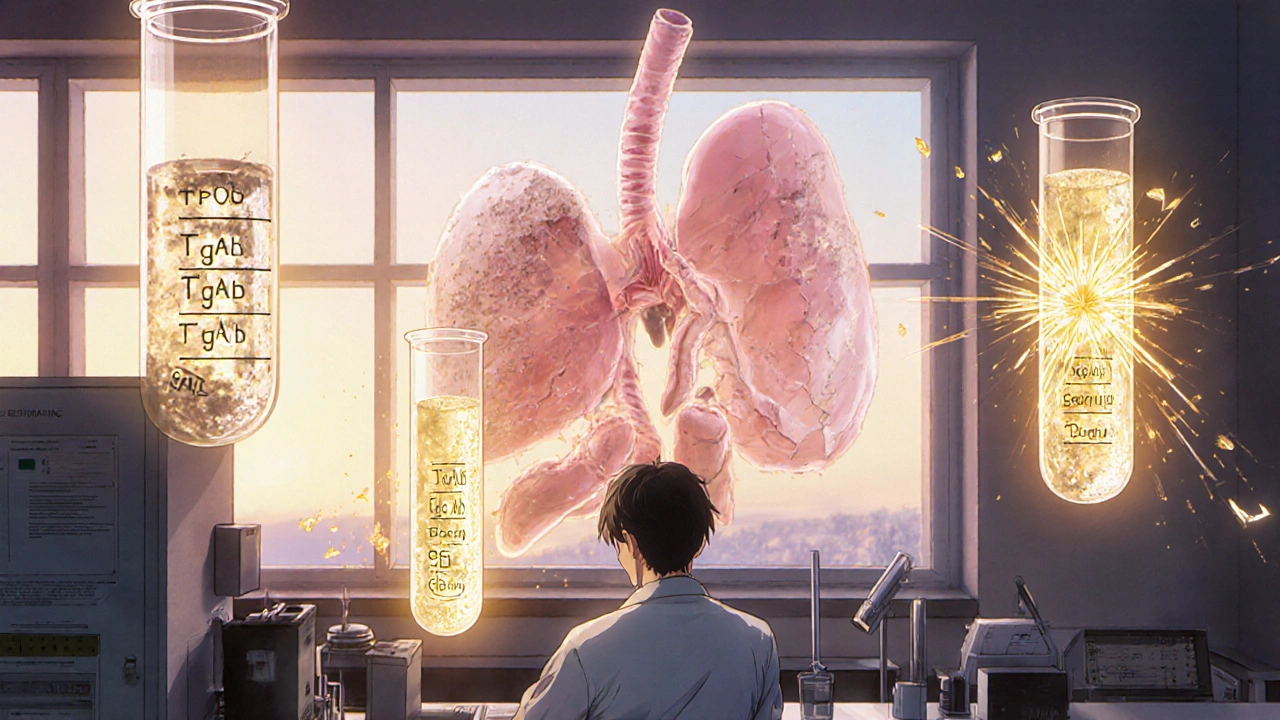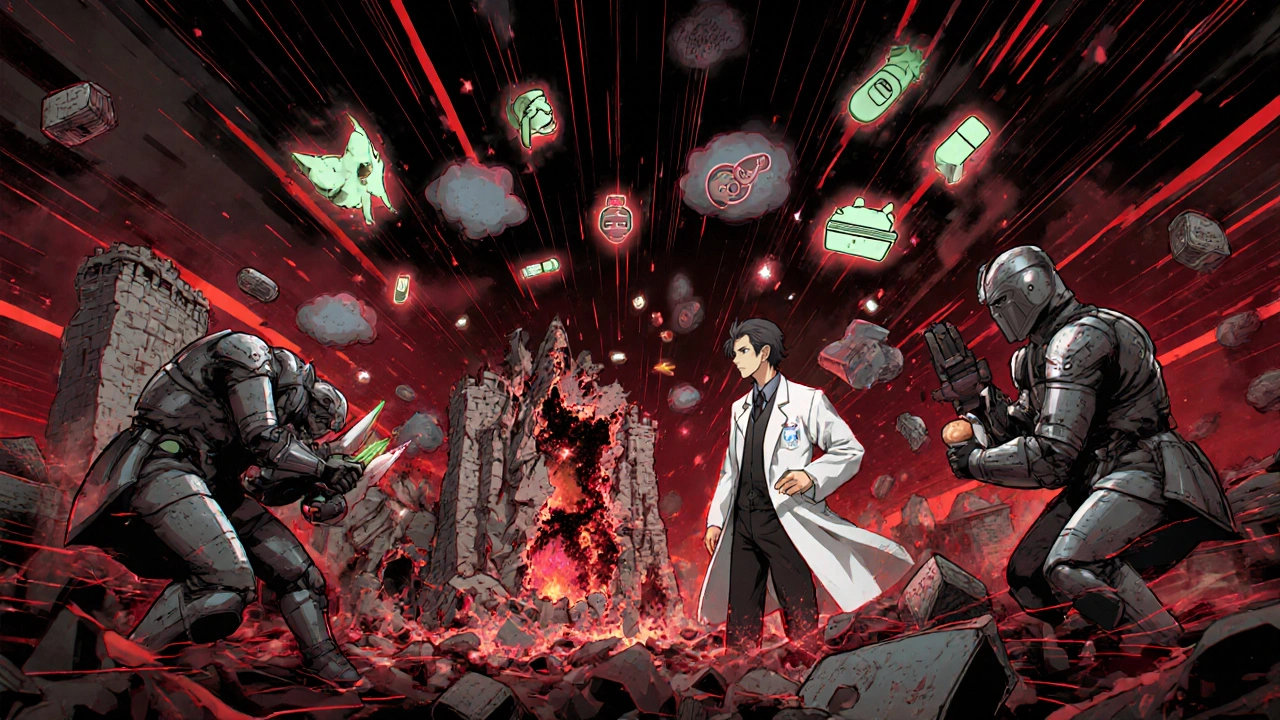Hashimoto's thyroiditis isn't just another thyroid problem. It's the most common reason people in countries like Australia, the U.S., and Canada end up with hypothyroidism - and it's not something you can fix with a quick fix. This is an autoimmune disease where your own immune system attacks your thyroid gland, slowly destroying its ability to make hormones. And the key to managing it? It's not just about taking a pill. It's about understanding how your TSH levels behave, why they fluctuate, and what really matters when your doctor says, "Your numbers are normal." Most people think if their TSH is between 0.5 and 4.5, they're fine. But that’s not always true - especially with Hashimoto's. I’ve seen patients on the same dose of levothyroxine for years, still exhausted, gaining weight, and feeling foggy - all while their TSH is "in range." Why? Because TSH alone doesn’t tell the whole story. Hashimoto's thyroiditis starts quietly. You might feel fine for years, but your blood tests show elevated thyroid antibodies - thyroid peroxidase (TPOAb) and thyroglobulin antibodies (TgAb). These are the fingerprints of your immune system going rogue. Around 90-95% of people with Hashimoto's have high TPOAb. That’s the most reliable marker. By the time your TSH climbs above 4.5 mIU/L and your free T4 drops, the damage is already done. The thyroid is shrinking. The inflammation is ongoing. And your body is struggling to keep up. There are four stages to this disease, and most people don’t even know they’re in one. Phase one: antibodies are up, but you feel fine. Phase two: TSH starts creeping up, maybe between 4.5 and 10. You might get tired easily, feel cold, or have dry skin - but your doctor says, "It’s not bad enough yet." Phase three: TSH jumps past 10, free T4 falls. Now you’re officially hypothyroid. Phase four: the thyroid shrinks so much, the goiter disappears. The inflammation calms down, but the damage is permanent. And here’s the twist: some people go through what’s called "hashitoxicosis." That’s when, early on, the immune attack causes the thyroid to leak stored hormones all at once. You suddenly feel anxious, your heart races, you lose weight - like you have Graves’ disease. But within weeks or months, the thyroid burns out, and you crash into hypothyroidism. It’s confusing. It’s scary. And if your doctor doesn’t know to check free T4 during this phase, you might get misdiagnosed or even treated with the wrong meds. Managing TSH isn’t about hitting a magic number. It’s about matching your dose to your life. For a 25-year-old woman trying to get pregnant, TSH should stay under 2.5 mIU/L. Studies show if it’s higher, your risk of miscarriage jumps by more than double. For a 75-year-old with heart disease? Pushing TSH too low could trigger atrial fibrillation. The American Thyroid Association now recommends higher targets for older adults - up to 6.0 mIU/L - because overtreatment can be dangerous. Dosing levothyroxine isn’t science fiction. It’s basic math: 1.6 mcg per kilogram of body weight is the starting point. But that’s just the beginning. Most people need adjustments. In fact, 68% of patients in patient surveys say they needed three or more dose changes before they felt normal. Why? Because absorption is everything. If you take your thyroid pill with coffee, calcium, iron, or even soy milk, your body absorbs less than half the dose. That’s why you need to take it on an empty stomach, at least 30 to 60 minutes before breakfast. And if you’re on supplements? Wait four hours. Same with antacids. One study showed 30% of patients needed higher doses simply because they were taking calcium with their thyroid med. Seasons matter too. In Melbourne, TSH levels rise an average of 1.8 mIU/L in winter compared to summer. That’s not just weather - it’s your body’s metabolism slowing down in the cold. Many patients don’t realize their winter fatigue isn’t just seasonal blues - it’s their thyroid dose needing a tweak. One endocrinologist I know adjusts doses every October and March based on this pattern. And then there’s biotin. It’s in every hair, skin, and nail supplement. But if you take 5 mg or more of biotin, it can throw off your TSH test by 20-30%. You might show up for a blood test, get a falsely low TSH, and your doctor lowers your dose - right when you need more. Always stop biotin at least 72 hours before your lab draw. Testing timing is just as critical. TSH levels drop temporarily if you take your pill right before the test. That’s why you need to skip your dose on the morning of the blood draw, and take it after. Do it at the same time of day every time - morning is best. And don’t switch brands. The FDA requires levothyroxine to carry a narrow therapeutic index warning because different brands can vary by 5-10% in absorption. Switching from Synthroid to a generic might mean you’re getting less hormone - and you won’t know until your symptoms come back. Some people ask: "Should I try T3 medication?" The answer is usually no. About 10-15% of patients still feel bad even when their TSH is perfect. That’s frustrating. But large studies, including one from 2017 that looked at over 1,000 patients, found no consistent benefit from adding T3 to levothyroxine. The American Association of Clinical Endocrinologists says only consider it after six months of optimized levothyroxine, and only if symptoms persist. Most don’t need it. What about diet? Gluten? The connection isn’t proven for everyone, but 32% of patients on Reddit’s Hashimoto’s community report worse symptoms after eating gluten. That’s not coincidence. There’s a known molecular mimicry between gluten proteins and thyroid tissue. If you’re still struggling despite perfect meds, cutting gluten for 3 months might be worth a try. Stress? 41% of patients say flare-ups follow major life events - divorce, job loss, illness. Cortisol messes with thyroid hormone conversion. Managing stress isn’t fluffy advice - it’s medical. Long-term, most people stabilize. After five years, 72% of patients in one survey report steady TSH levels with annual testing. The immune attack slows. The thyroid stops burning out. But you still need monitoring. Even if you feel great, skip a year of testing, and you might wake up with a TSH of 15. New research is coming. In 2022, scientists found that 25% of treatment-resistant cases have antibodies that block TSH receptors - something we used to think only happened in Graves’ disease. That could lead to new drugs targeting those specific antibodies. Clinical trials are already testing immunomodulators to calm the T-cells attacking the thyroid. If they work, we might see therapies that don’t just replace hormones - but stop the disease itself. For now, the goal is simple: find your dose, stick to your routine, test consistently, and don’t ignore symptoms just because your TSH is "normal." Your body is telling you something. Listen.
What’s the difference between Hashimoto’s and regular hypothyroidism?
Regular hypothyroidism means your thyroid isn’t making enough hormone - for any reason. Hashimoto’s is one specific cause: your immune system is destroying your thyroid. Other causes include thyroid surgery, radioactive iodine treatment, or certain medications. The big difference? Hashimoto’s comes with antibodies, inflammation, and a pattern of progression. You can’t cure it, but you can manage it. And knowing it’s autoimmune means you need to pay attention to triggers like stress, diet, and seasonal changes - things you might ignore with other types of hypothyroidism.
Can Hashimoto’s turn into Graves’ disease?
No, Hashimoto’s doesn’t turn into Graves’ disease. They’re two different autoimmune disorders. But they can sometimes happen one after the other, especially in people with a strong genetic predisposition. Some patients start with Hashimoto’s, then develop TSH receptor antibodies that stimulate the thyroid instead of blocking it - causing temporary hyperthyroidism. This is rare, but it happens. It’s not a transformation - it’s a shift in which antibodies dominate. That’s why testing for both TPOAb and TSH receptor antibodies matters in complex cases.
Why does my TSH keep changing even though I take my pill every day?
Because your body isn’t a machine. Weight changes, stress, illness, seasonal shifts, and even how you take your pill (with food? with coffee?) affect absorption and hormone needs. Your thyroid isn’t working, so your body has no buffer. A 5-pound weight gain might mean you need 12.5 mcg more levothyroxine. A bad flu might spike your TSH for weeks. That’s why testing every 6-8 weeks after a dose change - and annually once stable - is non-negotiable. Consistency in testing conditions (same time of day, same lab, no biotin) makes all the difference.

Is it safe to take levothyroxine long-term?
Yes. Levothyroxine is a synthetic version of the hormone your body naturally makes. Taking it long-term is safe when dosed correctly. The risks come from too little (ongoing hypothyroidism) or too much (heart strain, bone loss). The key is regular monitoring. Most people take it for life - and live perfectly healthy lives. The real danger isn’t the medication. It’s ignoring symptoms or skipping blood tests because you "feel fine."
Should I get tested for other autoimmune diseases if I have Hashimoto’s?
Yes. Hashimoto’s doesn’t happen in isolation. People with one autoimmune disease are more likely to have others. Common co-occurrences include type 1 diabetes, celiac disease, rheumatoid arthritis, and lupus. If you have unexplained symptoms - joint pain, rashes, digestive issues, frequent infections - ask your doctor about screening. A simple blood test for celiac antibodies (tTG-IgA) or ANA can uncover hidden conditions that make thyroid management harder.

What if my TSH is normal but I still feel awful?
Don’t accept that. About 12% of patients with "normal" TSH have low free T4 - meaning your body isn’t getting enough active hormone. Ask for a free T4 test. Also check free T3. Some people have trouble converting T4 to T3, especially under stress or with nutrient deficiencies (like low iron or selenium). If your doctor won’t test them, get a second opinion. Feeling tired, cold, and foggy isn’t normal - even if your TSH is "in range."
Can I ever stop taking levothyroxine?
Almost never. Once the thyroid tissue is destroyed by Hashimoto’s, it doesn’t regenerate. Stopping the medication will bring back hypothyroid symptoms - often quickly. In rare cases, if the disease is caught very early and antibodies drop, some patients may temporarily reduce their dose. But this is the exception, not the rule. Never stop or reduce your dose without medical supervision. The consequences can be serious: heart problems, depression, infertility, even myxedema coma in extreme cases.




Destiny Annamaria
November 19, 2025 at 01:50OMG I literally cried reading this. I was diagnosed 3 years ago and my doctor kept telling me my TSH was fine while I was falling apart. I finally found a functional med who checked my free T4 and T3 - mine were in the bottom 10%. Now I feel like a human again. Also, biotin? I was taking 10mg for my hair and my TSH looked magically low. My doctor lowered my dose and I almost passed out. Never again. 🙌
Ron and Gill Day
November 20, 2025 at 08:29This is the most overhyped, anecdotal garbage I’ve read all week. TSH is the gold standard. If your numbers are normal, you’re fine. Stop chasing phantom symptoms and blaming your diet. Gluten? Seriously? You’re not celiac, you’re just lazy. Also, why are you taking levothyroxine at all if you’re not even hypothyroid? This post is dangerous.
Alyssa Torres
November 21, 2025 at 05:14THIS. THIS IS WHY WE NEED MORE EDUCATION. I was in phase two for two years. My doctor said "it’s not bad yet." I was exhausted, gained 20 lbs, couldn’t focus at work. I pushed back. Got my antibodies tested. TPOAb was through the roof. Then I found out my free T3 was low. I switched to a combination therapy (after 6 months of optimized levothyroxine) and my brain fog lifted like a foghorn. It’s not about the number - it’s about how you FEEL. Your body knows before the lab does. Please, if you’re struggling - keep fighting. You’re not imagining it.
Summer Joy
November 22, 2025 at 17:39Okay but have you considered that maybe you’re just depressed? 🤔 I had a friend who swore her thyroid was broken - turned out she was going through a divorce, drank 3 glasses of wine a night, and didn’t sleep. She took thyroid meds for 8 months, then realized she just needed to stop crying into her oat milk latte. Also, biotin? Girl. That’s just a scam. Stop wasting money. 😭
Aruna Urban Planner
November 23, 2025 at 17:49The immunological cascade in Hashimoto’s follows a predictable pattern of epitope spreading, wherein T-cell reactivity expands from thyroglobulin to TPO antigens. The TSH set-point is modulated by cytokine-mediated feedback loops, particularly IL-17 and IFN-γ, which suppress NIS expression. Therefore, the clinical correlation between TSH and symptom burden is non-linear and confounded by peripheral deiodinase activity, especially in the context of low selenium status. A systems biology approach is required to optimize therapy beyond TSH normalization.
Nicole Ziegler
November 24, 2025 at 12:09Seasonal TSH shifts?? YES. I live in Minnesota. My dose is 100 mcg in summer, 112.5 in winter. My endo calls it "the snow effect." 🥶❄️ Also, I take my pill at 6am, no food, no coffee, no nothing. I’m the queen of thyroid discipline. 💅
Bharat Alasandi
November 25, 2025 at 08:42Bro in india we dont even have access to free t3 tests most times. My doc just checks tsh and says youre fine. I feel like garbage but cant afford private labs. Also i heard gluten thing is bs here because we dont eat bread like west. Still tired tho. 😔
Kristi Bennardo
November 26, 2025 at 16:07This post is irresponsible. You are encouraging patients to self-diagnose, disregard clinical guidelines, and pursue unproven dietary interventions. The American Thyroid Association recommends TSH targets based on robust, population-level data. Your anecdotal claims about gluten and biotin are not evidence-based medicine. This is how pseudoscience spreads. Shame on you for normalizing medical noncompliance.
Shiv Karan Singh
November 27, 2025 at 00:48lol you think your thyroid is special? I’ve had tsh 8.5 and felt fine. You’re all just hypochondriacs. Also biotin is for losers who think hair supplements fix everything. And gluten? That’s a fad. I eat pizza every day and my thyroid is perfect. You’re overthinking this. Just take the pill and shut up.
Ravi boy
November 28, 2025 at 05:56man i took my pill with coffee once and felt like a zombie for a week. i didnt know till i read this. now i take it at 6am before my chai. also i dont believe in gluten thing but i cut dairy and felt better. maybe its not the thyroid maybe its just my gut. idk. but i feel less bloated. 🤷♂️
King Over
November 28, 2025 at 12:10I’ve been on levothyroxine for 12 years. TSH always 2.1. Feel great. Take pill same time every day. No biotin. No gluten. No drama. Just take the pill and move on.
Johannah Lavin
November 29, 2025 at 17:41Thank you for writing this. I’ve been waiting for someone to say this out loud. I was told my TSH was fine but my free T3 was low - my doctor said "it’s not clinically significant." I got a second opinion. They switched me to liothyronine for 3 months. My energy came back. I cried in the shower. I’m not broken. I’m not lazy. I just needed someone to listen. 🫂 If you’re reading this and still feel awful - keep going. You’re not alone.